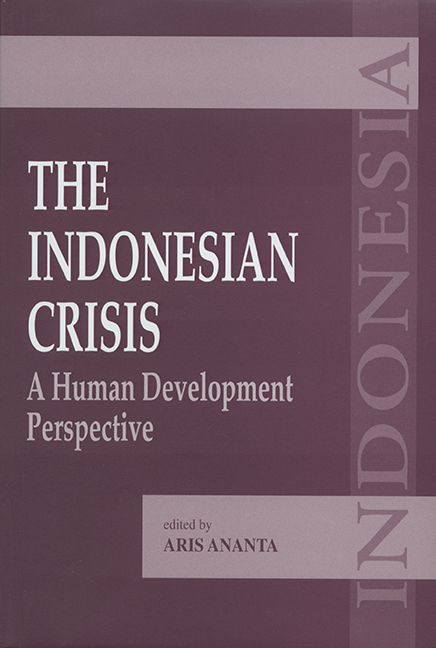Book contents
- Frontmatter
- Contents
- Acknowledgements
- List of Contributors
- Part I Introduction
- Part II Human Capital
- Part III Purchasing Power
- 9 Change in Consumer Price: Indonesian Cities, 1997–99
- 10 Social Safety Net Programmes in Indonesia: Some Efforts to Survive
- 11 State-Created Socio-Cultural Poverty: Lessons from Some Micro Studies
- 12 The Labour Market in Indonesia during the Crisis
- Part IV Emerging Issues
- Index
9 - Change in Consumer Price: Indonesian Cities, 1997–99
from Part III - Purchasing Power
Published online by Cambridge University Press: 21 October 2015
- Frontmatter
- Contents
- Acknowledgements
- List of Contributors
- Part I Introduction
- Part II Human Capital
- Part III Purchasing Power
- 9 Change in Consumer Price: Indonesian Cities, 1997–99
- 10 Social Safety Net Programmes in Indonesia: Some Efforts to Survive
- 11 State-Created Socio-Cultural Poverty: Lessons from Some Micro Studies
- 12 The Labour Market in Indonesia during the Crisis
- Part IV Emerging Issues
- Index
Summary
Price Change and Welfare
When price levels increase but incomes do not increase proportionately, purchasing power will decline, as well as welfare. However, when the increase does not occur for all goods and services, but only for a particular group of goods and services, people may not have to suffer. The rising prices may force society to reduce the consumption of those particular goods/services, and substitute with cheaper goods and services. For example, if the increase in the price of meat and fish is higher than the increase in the price of eggs, people may reduce the consumption of meat and fish and increase the consumption of eggs. However, it is unlikely that the increase in the price of rice will be followed by a reduction in the consumption of rice if the people view rice consumption as a must. For these people (the majority of Indonesians may still be categorized in this group) a rapid increase in the price of rice will hurt them severely.
When the prices of many goods/services increase but not at the same rate, the relative prices of those goods/services will change. If the price of one simple lunch in the canteen of the University of Indonesia was Rp1,000 in June 1997 and Rp2,500 in June 2000, the price of that good has risen by 150 per cent. If the price of the Kijang (a car) was 60 million rupiah in June 1997 and 120 million rupiah in June 2000, the price of the Kijang has risen by only 100 per cent. Therefore, the price of the simple food in the University of Indonesia has risen faster than the price of the Kijang. The relative price has changed. To buy one Kijang in June 1997 people had to sacrifice 60 thousand simple lunches in the University of Indonesia; in June 2000 people had to sacrifice only 48 thousand simple lunches. In other words, the Kijang had become cheaper relative to the simple lunch, or that simple lunch had become relatively more expensive compared with the Kijang.
The above example may illustrate that those whose budget for a simple lunch is relatively large in their overall budget may suffer more than those whose simple lunch does not comprise a big portion of their overall budget.
- Type
- Chapter
- Information
- The Indonesian CrisisA Human Development Perspective, pp. 247 - 265Publisher: ISEAS–Yusof Ishak InstitutePrint publication year: 2002



